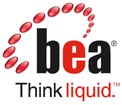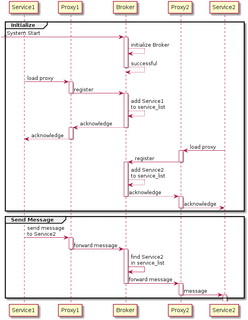| Developer(s) | Red Hat |
|---|---|
| Stable release | 5.3.1 / Feb 20 2013 [1] |
| Written in | Java |
| Operating system | Cross-platform |
| Type | Service-oriented architecture (SOA), Enterprise service bus (ESB) |
| License | GNU Lesser General Public License |
| Website | http://www.jboss.com/products/platforms/soa/ |
The JBoss Enterprise SOA Platform (or JBoss SOA Platform) is free software/open-source Java EE-based service-oriented architecture (SOA) software. The JBoss Enterprise SOA Platform is part of the JBoss Enterprise Middleware portfolio of software. [2] The JBoss Enterprise SOA Platform enables enterprises to integrate services, handle business events, and automate business processes, linking IT resources, data, services and applications. [3] [4] Because it is Java-based, the JBoss application server operates cross-platform: usable on any operating system that supports Java. The JBoss SOA Platform was developed by JBoss, now a division of Red Hat.
The JBoss Enterprise Service Bus (JBossESB, or JBoss ESB) software is part of the JBoss Enterprise SOA Platform. The software is Enterprise Application Integration (EAI) or business integration software. [5] In general, enterprise service bus (ESB) software is used to map the Service-Oriented Infrastructure (SOI) and Service-Oriented Architecture (SOA) concepts onto a concrete implementation. The software is middleware used to connect systems together, especially non-interoperable systems. The software contains the following: [6]
The JBoss Enterprise Data Services Platform (JBoss EDSP) is data virtualization software, a superset of the JBoss Enterprise SOA Platform. [7] The JBoss EDSP uses the enterprise service bus (ESB) software JBoss Enterprise Service Bus (JBossESB). The JBoss EDSP includes:
JBoss itself is open source, but Red Hat charges to provide a support subscription for JBoss Enterprise Middleware.
Middleware in the context of distributed applications is software that provides services beyond those provided by the operating system to enable the various components of a distributed system to communicate and manage data. Middleware supports and simplifies complex distributed applications. It includes web servers, application servers, messaging and similar tools that support application development and delivery. Middleware is especially integral to modern information technology based on XML, SOAP, Web services, and service-oriented architecture.

BEA Systems, Inc. was a company that specialized in enterprise infrastructure software products which was wholly acquired by Oracle Corporation on April 29, 2008.

An enterprise service bus (ESB) implements a communication system between mutually interacting software applications in a service-oriented architecture (SOA). It represents a software architecture for distributed computing, and is a special variant of the more general client-server model, wherein any application may behave as server or client. ESB promotes agility and flexibility with regard to high-level protocol communication between applications. Its primary use is in enterprise application integration (EAI) of heterogeneous and complex service landscapes.
An enterprise messaging system (EMS) or messaging system in brief is a set of published enterprise-wide standards that allows organizations to send semantically precise messages between computer systems. EMS systems promote loosely coupled architectures that allow changes in the formats of messages to have minimum impact on message subscribers. EMS systems are facilitated by the use of structured messages, and appropriate protocols, such as DDS, MSMQ, AMQP or SOAP with web services.
Java Business Integration (JBI) is a specification developed under the Java Community Process (JCP) for an approach to implementing a service-oriented architecture (SOA). The JCP reference is JSR 208 for JBI 1.0 and JSR 312 for JBI 2.0. JSR 312 was removed from the JCP balloting process on 17 Dec, 2010 by the submitters without being accepted.
Mule is a lightweight enterprise service bus (ESB) and integration framework provided by MuleSoft. The platform is Java-based but can broker interactions between other platforms such as .NET using web services or sockets.
MetaMatrix was a U.S.-based technology company that created an enterprise information integration (EII) software product to deliver data services for service-oriented architectures. Founded in 1998 as Quadrian, MetaMatrix has development offices in St. Louis and Boston, and business offices in NY, Baltimore, Washington, DC, Boston, and London.
Oracle Fusion Middleware consists of several software products from Oracle Corporation. FMW spans multiple services, including Java EE and developer tools, integration services, business intelligence, collaboration, and content management. FMW depends on open standards such as BPEL, SOAP, XML and JMS.
This article is a comparison of notable business integration and business process automation software.

A message broker is an intermediary computer program module that translates a message from the formal messaging protocol of the sender to the formal messaging protocol of the receiver. Message brokers are elements in telecommunication or computer networks where software applications communicate by exchanging formally-defined messages. Message brokers are a building block of message-oriented middleware (MOM) but are typically not a replacement for traditional middleware like MOM and remote procedure call (RPC).
OpenESB is a Java-based open-source enterprise service bus. It can be used as a platform for both enterprise application integration and service-oriented architecture. OpenESB allows you to integrate legacy systems, external and internal partners and new development in your Business Process. OpenESB is the unique open-source ESB relying on standard JBI, XML, XML Schema, WSDL, BPEL and Composite application that provides you with simplicity, efficiency, long-term durability, and savings on your present and future investments with a very low TCO.
Service-oriented architectures (SOA) are based on the notion of software services, which are high-level software components that include web services. Implementation of an SOA requires tools as well as run-time infrastructure software. This is collectively referred to as a service-oriented architecture implementation framework or (SOAIF). The SOAIF envisions a comprehensive framework that provides all the technology that an enterprise might need to build and run an SOA. An SOAIF includes both design-time and run-time capabilities as well as all the software functionality an enterprise needs to build and operate an SOA, including service-oriented:
Oracle Enterprise Service Bus, a fundamental component of Oracle's Services-Oriented Architecture suite of products, provides integration of data and enterprise applications within an organisation and their connected enterprises.
Drools is a business rule management system (BRMS) with a forward and backward chaining inference based rules engine, more correctly known as a production rule system, using an enhanced implementation of the Rete algorithm.
Red Hat Fuse is an open source integration platform based on Apache Camel. It is a distributed integration platform that provides a standardized methodology, infrastructure, and tools to integrate services, microservices, and application components.
Fuse Services Framework is an open source SOAP and REST web services platform based on Apache CXF for use in enterprise IT organizations. It is productized and supported by the Fuse group at FuseSource Corp. Fuse Services Framework service-enables new and existing systems for use in enterprise SOA infrastructure.
JBoss Developer Studio (JBDS) is a development environment created and currently developed by JBoss and Exadel.
Java Composite Application Platform Suite is a standards-based enterprise service bus software suite from Oracle Corporation. The suite has several components that help to integrate existing applications and deliver new business services in a service-oriented architecture environment. It is a Java EE compliant platform and provides application-to-application integration, business-to-business integration, business process management along with integrated human workflow, an Enterprise Information Portal, extract transform and load (ETL), business activity monitoring and composite application development.
The JBoss Enterprise Application Platform is a subscription-based/open-source Java EE-based application server runtime platform used for building, deploying, and hosting highly-transactional Java applications and services developed and maintained by Red Hat. The JBoss Enterprise Application Platform is part of Red Hat's Enterprise Middleware portfolio of software. Because it is Java-based, the JBoss application server operates across platforms; it is usable on any operating system that supports Java. JBoss Enterprise Application Platform was originally called JBoss and was developed by the eponymous company JBoss, acquired by Red Hat in 2006